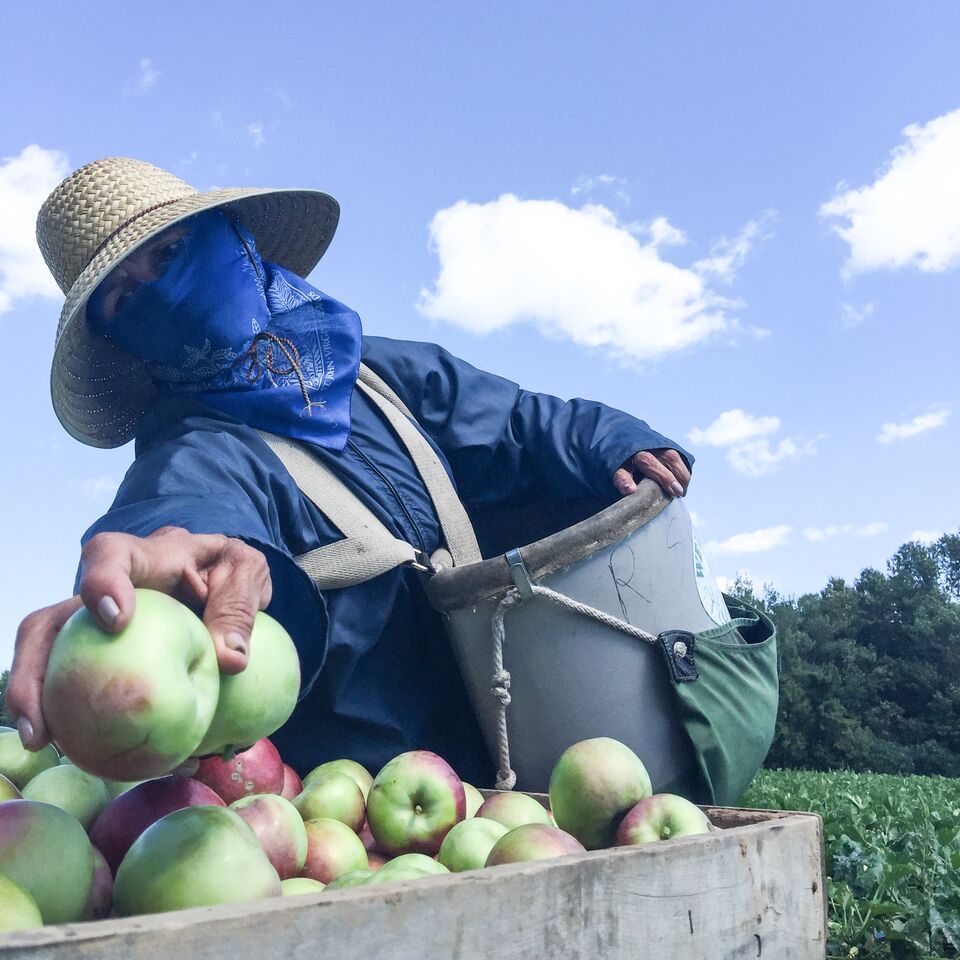C.A. felt something was wrong when he was assigned to pick apples in fields without enough ripe crops to meet the required five boxes per day. The 40-year-old seasonal worker from Jamaica joined several other workers to complain to the manager that it would be impossible to meet their required minimum.
The manager told them that he knew the fields did not have enough apples for workers to meet the quota, but he would not hold that against them, according to C.A., who asked to be referred to by his initials due to the fear of reprisal from potential future employers. Meanwhile, workers from Mexico, who were not perceived to be with the union, were assigned to fields with enough apples to pick.
Also Read: A Year Later, New York’s First Farm Workers Union Struggles to Secure Its First Contract
C.A., a 40-year-old Jamaican laborer who arrived last August at Cahoon Farms in Wolcott, New York, thought that he was set up to fail after the farm manager learned that C.A. supported the union’s effort to collectively bargain a contract.
“The manager referred to us as union guys,” C.A., who preferred to go by his initials to avoid affecting his future employment opportunities as an H-2A visa guest worker, told Documented in a phone interview from Jamaica. “He had something against the union.”
One week before the end of their contract, 11 workers, including C.A., got a letter of termination stating that they had not met the quota. For C.A., there was no doubt that they were dismissed as retaliation. “It was because of the union that they did that,” C.A. said, echoing that the managers of Cahoon Farms had set them up to fail.
After the Farm Laborers and Fair Labor Practices Act took effect in 2020, five apple and vegetable farms, including Cahoon, voted to unionize. It was a huge victory, advocates say, because for farmworkers to avoid retaliation and abuse from employers, it is crucial to collectively bargain a contract. Advocates say employers have too much power over farmworkers, most of whom are H-2A visa holders and undocumented immigrants, with negligible labor protections.
The H-2A visa program, which grants work permits to temporary agricultural laborers, has been rife with abuse — including wage theft, sexual assault, human trafficking, and conditions some have compared to indentured servitude. Since employers are in control of their workers’ visas, undocumented workers can be intimidated with the threat of deportation.
Also Read: How Green Empire Farms Failed to Stop One of New York’s Biggest COVID-19 Outbreaks
The new law, however, grants H-2A visa holders and undocumented laborers the right to unionize and bargain collectively through representatives of their own choosing. These groups were considered impossible to organize due to their vulnerabilities, said Richard Witt, executive director of the Rural & Migrant Ministry in Cornwall-on-Hudson, New York, who co-led the push to get the Farm Laborers Fair Labor Practices Act approved, and called the passage of this law “historic.”
After a campaign that lasted for more than 20 years, the bill was finally approved in 2019 by a Democratic supermajority in the state legislature. It became New York’s first step into amending an exclusion baked into the National Labor Relations Act (NLRA) of 1935, which denied collective bargaining rights to farm laborers and domestic workers, many of whom were Black. The exclusion came as a concession to Southern legislators.
The law aims to benefit the 40,000 to 80,000 workers that toil in New York farms every year, including domestic, guest workers, immigrants and seasonal farmworkers. Still, several New York growers have refused to negotiate contracts with the workers’ representatives.
United Farm Workers (UFW), the storied labor union co-founded by César Chávez and Dolores Huerta, are representing the nearly 500 farmworkers, mostly from Jamaica and Mexico, in the negotiations with the five unionized farms. The UFW has filed for certification at two additional farms, one of which, the Cherry Lawn Fruit Farms LLC near Rochester, was officially certified by the Public Employment Relations Board, the UFW announced on May 2.
Also Read: Death of a Dairy Farm Worker Exposes Dangerous Conditions and Labor Abuse
But the growers of the previously five unionized companies — Wafler Farms in Wolcott, Porpiglia Farms in Marlboro, Kirby Farms in Albion, Lynn-Ette & Sons Farms in Kent, and Cahoon Farms, where C.A. was recruited — have avoided negotiations with intimidation tactics, according to complaints filed by the UFW. The NYS Vegetable Growers Association and four of the five unionized farms, including Cahoon, also filed a lawsuit to prevent negotiations. Cahoon Farms did nor respond to a request for comment.
According to charges filed by the UFW at the Public Employment Relations Board of New York in 2023, owners of the Porpiglia Farms broke into workers living spaces without permission and physically intimidated a lone female union organizer and threatened her with arrest — in violation of New York law. At Lynn-Ette & Sons Farms, an owner demanded an organizer to leave and threatened to have her arrested, while at Wafler Farms, an owner directed a profanity-laced rant at his workers caught on video last September.
“There’s probably no moment in United States history when a step toward ending racism has not met with pushback,” Witt said.
With a law and a union, farmworkers still struggle in New York
Last October, growers led by the NYS Vegetable Growers Association challenged the Farm Laborers Fair Labor Practices Act in court, asserting that H-2A workers can’t collectively bargain because of “the terms and conditions of employment,” governed by “specific, time-limited contracts required by federal law,” according to the lawsuit. The NYS Vegetable Growers Association did not respond to a request for comment.
However, the U.S. Department of Labor had stated last September that H-2A farmworkers should have access to unions and collective bargaining contracts because, according to Secretary of Labor Julie Su, they “are particularly vulnerable to labor abuses.”
Also Read: Wage Theft Plagues the Immigrants of New York’s Horse Racing Industry
Publicly, the NYS Vegetable Growers Association presented another argument: that the farm owners were protecting “farmworkers’ constitutional right of freedom of association.” In February, a district judge in New York stated that the growers did not represent the interest of farmworkers and restored the Farm Laborers Fair Labor Practices Act. The decision allowed collective bargain negotiations to resume after a six-month hiatus.
“We are now negotiating with various employers to get the process back on track,” said Armando Elenes, secretary-treasurer of the UFW, who is directly involved in the negotiations in New York. Still, growers are maneuvering to stall the talks. For example, growers are refusing to provide basic information such as a list of employees, in violation of the law, according to Elenes.
Given the growers’ reluctance to negotiate, the UFW announced on May 2 that it requested the NYS Public Employment Relations Board to order the farm owners into binding arbitration in order to produce union contracts.
A critical aspect of the negotiations is establishing “the right to recall,” which means that if workers comply with the contracted requirements, they should expect to be recruited back the following season. It also entails having a formal mechanism to have their cases heard if they consider their dismissal unjustified. This right would end the brazen retaliatory practices used as an intimidation tactic to prevent workers from organizing.
Right now, growers have outsized power, especially when workers live on the employer’s premises, which is often the case in New York, Elenes said. This allows growers to treat laborers “as indentured servants, controlling who they can talk to or who can visit them,” he added.
一文教你如何成为街头市集或夜市摊主
Also Read: Two Immigrants Sue New York Employer Over Dangerous Farmworker Housing
The United Food and Commercial Workers International Union (UFCW) has also won certifications for farmworkers in New York, primarily in vineyards as well as nurseries and dairy farms, and it has also denounced harassment against workers who organized. However, the UFCW does not represent H-2A guest visa laborers, particularly exposed to retribution as they are contractually tied to a single employer.
Despite the growers’ resistance, if workers are able to negotiate a collective contract for H-2A and undocumented workers in New York farms, advocates in other states may push their legislatures to pass similar laws to grant farm workers the right to collectively bargain, Witt explained. Apart from New York, only California and Hawaii have a state law granting collective bargaining rights to farmworkers.
“I believe it’s very important to have a union, as the union can step in and see that a person has dealt with fairly,” C.A. said. He is hopeful that if a collective contract is finalized with Cahoon Farms, he and his coworkers will be recalled for the next season: “We need to feed our families, so lots of guys here have high expectations of going back.”














